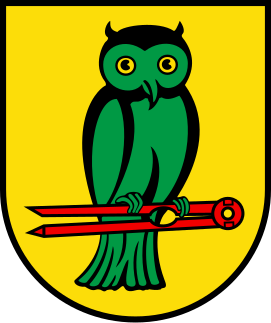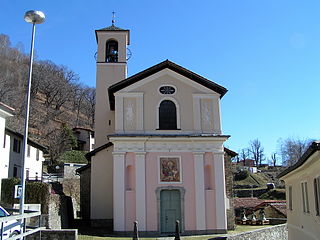Historic population
The historical population is given in the following chart: [2]

Cagiallo is a village and former municipality in the canton of Ticino, Switzerland.
In 2001 the municipality was merged with the other, neighboring municipalities Lopagno, Roveredo, Sala Capriasca, Tesserete and Vaglio to form a new and larger municipality Capriasca. [1]
Cagiallo is first mentioned in the 13th Century as Guzallo. In 1335 it was mentioned as Cazallo. [2] Together with Lopagno and Campestro, Cagiallo formed a Bürgergemeinde from the Middle Ages through the modern era.
The late medieval church of S. Matteo was rebuilt 1672, but retained the romanesque clock tower. The village was part of the parish of Tesserete. The Chapel of St. Lucia is first mentioned in 1606, and the Chapel of St. Sebastian in Almatro was built in 1682. [2]
The pre-industrial economy was based on agriculture and emigration. In the 18th and 19th Centuries, the Battaglini family played an important role throughout the valley. Cagiallo supports the tourist facilities and hotels of the village of Tesserete, and has become a suburb of it in recent years. [2]
The former municipality also contained the villages Sarone, Almatro, Bettagno and San Matteo-Muralta.
The historical population is given in the following chart: [2]


There are 106 municipalities in the canton of Ticino, Switzerland,. Municipalities (comuni) are grouped in circles (circoli) which are part of districts (distretti).

Montagnola is a small Swiss village in Collina d'Oro municipality. Located in the Italian-speaking canton of Ticino, it is close to the border between Switzerland and Italy. It looks over Lake Lugano and the city of Lugano upon it. It falls within the local parish of Sant'Abbondio Gentilino.

Lumnezia is a valley region and a municipality in the Surselva Region in the Swiss of canton of Graubünden. The former municipalities of Cumbel, Degen, Lumbrein, Morissen, Suraua, Vignogn, Vella, and Vrin merged on 1 January 2013 into the new municipality of Lumnezia. It covers the Val Lumnezia, a Swiss high alpine valley. Its upper regions are among the most remote areas in the Swiss Alps. The official language is Romansh.
Capriasca is a municipality in the district of Lugano in the canton of Ticino in Switzerland.
Ponte Capriasca is a municipality in the district of Lugano in the canton of Ticino in Switzerland.

Mugena is a village and former municipality in the canton of Ticino, Switzerland.
Arosio is a village and former municipality in the canton of Ticino, Switzerland.
Auressio is a village and former municipality in the canton of Ticino, Switzerland.
Loco is a village and former municipality in the canton of Ticino, Switzerland.
Campestro is a village and former municipality in the district of Lugano in the canton of Ticino, Switzerland.
Lopagno is a village and former municipality in the canton of Ticino, Switzerland.
Sala Capriasca is a village and former municipality in the canton of Ticino, Switzerland.
Roveredo is a village and former municipality in the canton of Ticino, Switzerland.

Tesserete is a village and former municipality in the canton of Ticino, Switzerland.

Vaglio is a village and former municipality in the canton of Ticino, Switzerland.
Russo is a village and former municipality in the district of Locarno in the canton of Ticino, Switzerland.

Comologno is a village and former municipality in the district of Locarno in the canton of Ticino, Switzerland.

Ilanz/Glion is a municipality in the Surselva Region in the Swiss canton of Graubünden. On 1 January 2014 the former municipalities of Castrisch, Ilanz, Ladir, Luven, Pitasch, Riein, Ruschein, Schnaus, Sevgein, Duvin, Pigniu, Rueun, and Siat merged into the new municipality of Ilanz/Glion.

Albula/Alvra is a municipality in the Albula Region in the canton of Graubünden in Switzerland. On 1 January 2015 the former municipalities of Alvaschein, Mon, Stierva, Tiefencastel, Alvaneu, Brienz/Brinzauls and Surava merged to form the new municipality of Albula/Alvra.

Domleschg is a municipality in the Viamala Region in the Swiss canton of Graubünden. On 1 January 2015 the former municipalities of Almens, Paspels, Pratval, Rodels and Tomils merged to form the new municipality of Domleschg.